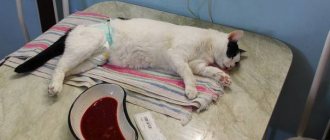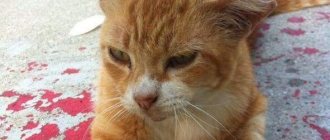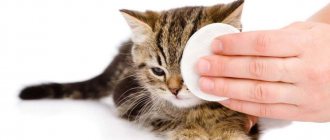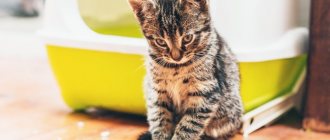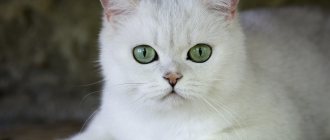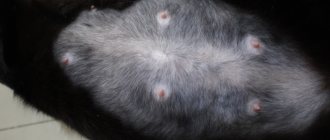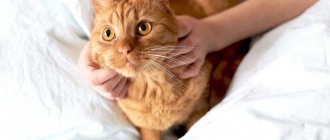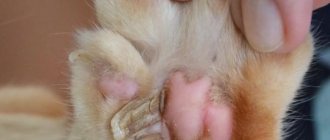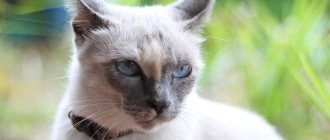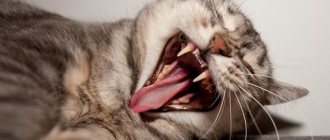General information
Diarrhea is not a disease in itself, but only a symptom indicating some kind of pathology. Moreover, the latter can be anything from a mild eating disorder to cases of oncology. So any episode of loose stool in your pet needs to be dealt with separately, contacting a veterinarian at the slightest suspicion of something wrong.
However, there is no need to panic right away: many cats, as well as people, repeatedly suffer from bouts of acute diarrhea throughout their lives. By “acute” we mean sudden onset diarrhea . Note that episodic and rare cases of digestive disorders most often do not indicate anything serious, but there is still a certain probability, for example, of the presence of a malignant tumor in the animal’s intestines. It is impossible to determine something serious here “by eye”, and there are no rules here.
There is only one general recommendation - if the animal feels normal, plays and eats, there is no particular reason for alarm.
Predisposing factors
A very common cause of “liquefied” feces in cats is a common eating disorder. This is especially true when the pet is fed... milk! Yes, yes, it is (in most cases) even harmful to cats, since the body of an adult animal, in principle, does not digest this product. Moreover, lactose intolerance is the “calling card” of almost all representatives of the cat family.
What happens when a cat drinks milk? Nothing good: since the animal’s digestive tract lacks the enzymes necessary to digest its components, the product begins to curdle. Soon the lumps of former milk begin to simply rot. When they enter the intestines, rich in microflora, from the stomach, the process accelerates several times. This doesn't lead to anything good.
In short, we would not recommend feeding a pregnant cat milk. Yes, it contains a lot of calcium, which is so necessary for future kittens, but the mother’s body still cannot absorb it. If there is such a need, it is better to compensate for its deficiency with the help of multivitamin preparations recommended by veterinarians. Of course, the list of all possible reasons is much longer:
- Food allergies and intolerance to some feed components.
- Parasitic and helminthic infestations .
- Malignant and benign tumors in the intestinal lumen.
- Viral, fungal or bacterial infections .
Separately, I would like to dwell on the quality of feed received by the animals. Believe me, the cat's body is very sensitive to poor nutrition! Never feed your pet stale food from the refrigerator. Such a diet will not only lead to diarrhea, but can subsequently cause, for example, cancer of the gastrointestinal tract.
If a pregnant cat has diarrhea in the later stages (or in the early stages, which is even worse) regularly, you need to consult a veterinarian, since this no longer looks like a normal digestive disorder.
Viral infections
Cats are susceptible to many viral infections. And almost all of them are accompanied by the development, including severe diarrhea.
The most common pathologies are:
- Feline panleukopenia (also called feline distemper).
- Leukemia (FeLV).
- Feline immunodeficiency virus (FIV).
- Feline coronavirus.
- Infectious peritonitis (FIP).
Unlike bacterial infections, viral infections in animals develop very quickly; suddenly, the pet’s body temperature increases very quickly. Let's look at the “parasitic” causes of diarrhea in pregnant cats.
Bacterial infections
Most often, uncontrollable diarrhea in animals is caused by: salmonella, pathogenic strains of E. Coli (common Escherichia coli), clostridia and campylobacter. Many of these pathogens are most often diagnosed in young cats, as well as in animals with weakened immune systems (and this can happen during pregnancy). These pathogens cause severe diarrhea, the animal completely loses its appetite, the pet becomes apathetic, a fever is possible, and the cat vomits. If nothing is done, death is possible.
The cat will give birth soon, the cause of diarrhea before childbirth
Diarrhea in the last week before the onset of labor may begin due to the body’s preparation for the upcoming labor. And if the cat behaves calmly, you are sure that she could not have been poisoned by anything, then there is no reason to worry about the health of the animal. The body cleanses itself before the birth process, which can occur very soon.
If the birth is soon, a pregnant cat usually refuses to eat, she may have diarrhea. Before the birth begins, she begins preparing the nest; for this she can carry soft rags and things to a certain place. Therefore, it is better for the owners to think about this in advance and prepare a “maternity house” in the form of a box or plastic box. Cover the bottom of the box or drawer with an old sheet, show the future mother-cat the place of future birth and encourage her to stay in the prepared “house”.
If the case is not severe, the pregnant cat should be on a therapeutic diet. To do this, prepare a disposable syringe without a needle and try to give the cat a five percent glucose solution. Diarrhea in this situation can be treated with phthalazole. To do this, divide the tablet into eight parts and give the animal one part about four times a day. You can use the advice of traditional medicine. A decoction made from chokeberry, oak bark, pomegranate skins, and rice water fastens well.
But if diarrhea is frequent, the temperature rises, the animal becomes weak; for a cat, diarrhea in the last week of pregnancy is dangerous, as it can lead to miscarriages . What to do in this situation? The cause of the disease may vary. Immediately take the sick animal to a specialist to determine the diagnosis.
Parasitic diseases and diarrhea in pregnant cats
Coccidiosis
It is one of the most common pathologies of this type, and diarrhea is the main (often the only) one. With coccidiosis, blood and mucus almost always appear in the stool.
Interestingly, coccidia, the causative agent of the disease, can be found in the intestines of even a completely healthy cat. It’s just that her body effectively suppresses the pathogen, and therefore nothing bad happens. The problem is that during pregnancy your pet experiences severe stress. The process of bearing kittens is a huge stress for her body, and therefore the likelihood of a “breakdown” of the immune system increases markedly. In addition, during this same period, parasitic worms may become more active, which will also increase the risk of developing diarrhea and worsen the general condition of the pet.
Giardia
In the presence of these microscopic parasites, the cat develops profuse diarrhea, and the feces in this case are pale and have a “greasy” appearance.
But at first, the excreted feces will have a greenish or yellowish color. Note that the appearance of blood in them during giardiasis is a very bad sign. Not very characteristic signs of this disease are: gradually developing exhaustion, abdominal pain, and vomiting (due to severe intoxication).
Cryptosporidium
Cryptosporidium is the only protozoan capable of intracellular parasitism in cats. They are often the cause of episodic diarrhea in animals with weakened immune systems.
Parasites of the genus Tritrichomonas
Tritrichomonas are unique parasites. To begin with, the very fact of their presence in the body of cats was proven relatively recently. There is still no detailed description of the disease that occurs as a result of a cat being infected with these protozoa. In addition to diarrhea, inflammation of the animal’s anus is considered a relatively “characteristic” clinical sign.
Other diseases and pathologies
Let's consider other predisposing factors that often lead to diarrhea in pregnant (and not only) pets
- A sudden change in diet.
- Foreign bodies, including hairballs, in the gastrointestinal tract.
- Pancreatic insufficiency.
- Idiopathic inflammatory bowel disease (i.e. a pathology whose underlying cause remains unknown).
- Irritable bowel syndrome.
- Liver and kidney diseases (often aggravated in late pregnancy).
- Diabetes.
- Hyperthyroidism.
Thus, loose stools in a pregnant cat can be explained by many reasons.
If diarrhea persists for two days or more, you should definitely take your pet to the vet.
Causes of diarrhea
Pregnant cats are susceptible to various viruses and bacteria, which can lead to intestinal dysfunction. The most common causes of intestinal upset are:
- Food intolerance. Pregnancy is not the time to experiment with a new diet. Sometimes even familiar foods can give an unpredictable reaction from your pet. Most often, this reaction is observed to the following type of food: milk and dairy products, beef, horse meat, soy, fatty fish, chicken eggs. The body of an animal in an interesting situation often gives an allergic reaction to a previously well-tolerated food, which is manifested by diarrhea.
- Very often, a pet expecting a replenishment constantly feels hungry and, if you follow her lead, this can lead to the development of diarrhea. This occurs due to the fact that a large volume of food moves rapidly through the intestines and is not absorbed into the circulatory system. Thanks to this process, the feed enters the intestines in a liquefied state. This type of diarrhea occurs once. In this case, it is necessary to reduce the pet’s portion.
- If a cat is walking on the street, then she may well pick up something from a garbage container or eat a sick rodent.
- If a cat has not undergone a parasite removal procedure before mating, then worms can cause her to feel unwell. In this case, there is blood and mucus in the loose stool.
- If the pet was sick and was treated with medications, then drug resistance may occur; antibiotics often give such a reaction.
- In long-haired cats, a similar reaction can develop when hair gets into the digestive tract.
- If your pet has not been vaccinated against diseases such as enteritis or distemper, then pregnancy is the most susceptible time for the occurrence of infectious diseases. In this case, in addition to diarrhea, the animal develops fever and vomiting. If such symptoms are detected, you need to urgently contact a veterinarian, otherwise there is a risk of losing the cat and offspring.
- Stress can also cause loose stools; it is better to limit a pregnant cat from visiting guests or traveling on public transport.
- Another reason is hormonal changes in the body.
- If in the early stages the animal has loose stools, then this is a reason for an urgent visit to the veterinary clinic. Because there is a high risk of miscarriage.
Diarrhea 2 days before lambing is normal and should not cause concern to the owner. If your pet is calm and, in addition to loose stools, does not experience vomiting or fever, then there is no reason to worry. Soon we can expect the replenishment of the long-awaited offspring.
Some cat breeds, such as Devon Rex or Sphynx, react most acutely to any change in diet by producing loose stools.
When should you visit a veterinarian immediately?
But it's not always worth waiting that long. If you observe at least one of the following symptoms in your pet, you need to urgently show it to a veterinarian, without putting it off “for later”:
- Fever.
- When you palpate the abdomen, the cat meows dissatisfied and hoarsely (this indicates a pain reaction).
- Copious amounts of blood in the stool. Bloody diarrhea in a pregnant cat is very, very bad!
- Apathetic state.
- Weight loss.
- Dehydration.
- Complete lack of appetite. It is worth noting here that immediately before giving birth, refusal to feed is quite normal.
- Disgusting odor from feces. Of course, in cats, in principle, they do not smell like violets, but with some diseases the “aroma” becomes completely intolerable.
- The animal is constantly pushing.
When is specialist help needed?
Of course, you should not neglect the help of a specialist. But if there are no more cases of diarrhea, the cat returns to its normal diet, and the cat’s well-being does not cause you any concern - limit yourself to light treatment with herbs and activated carbon . If the animal’s condition worsens, diarrhea becomes more frequent, the cat refuses food and water, the disease is accompanied by frequent vomiting, or there is blood in the feces, contact a specialist immediately! These symptoms may indicate illness. And if appropriate measures are not taken in time, the consequences can be disastrous.
What can you do at home?
Simple cases can be treated at home. The most correct thing is to put your pet on a starvation diet . Duration – no more than a day. In more complex cases, it is recommended to “put” your pet on a diet consisting of 50% boiled rice and another 50% boiled chicken. Never give your animal dairy products. If your pet's condition does not improve within two to three days, be sure to contact your veterinarian. In addition, do not overdo it with rice - if you feed it to your pet for a long time, she will probably develop severe constipation.
Be sure to ensure that the animal does not develop dehydration . The more severe the diarrhea, the more water his body loses. How do you know if this process has begun in your cat's body? Pretty simple - feel her gums. Sticky or dry, they may indicate dehydration. A healthy animal's gums should be firm, moist and smooth to the touch. You can simply squeeze the animal's skin into a pinch and quickly release it. If the cat's body is not dehydrated, the skin will almost immediately return to its previous appearance. Otherwise, we are talking about dehydration.
In addition, you should encourage your cat to drink more water. The easiest way to do this is to use liquid chicken broths (with a little salt added).
Treatment at home
Due to the fact that you do not always have the time, opportunity or finances to visit a clinic, you can carry out some therapeutic measures yourself at home. If diarrhea in kittens or adult animals is not accompanied by fever, refusal to eat or lethargy, then:
- limit your cat's intake of dairy products,
- provide the cat with the necessary amount of water (preferably boiled),
- try to exclude food for 24 hours (no need to be scared, this will only benefit the cat),
- exclude canned cat food (it is better to give boiled rice and boiled meat, in some cases - meat puree),
- If the condition has returned to normal, you can switch to normal mode.
Clinical methods
Despite all of the above, the most effective treatment for diarrhea in a pregnant cat is in a well-equipped clinic. And even here there are difficulties. The fact is that many drugs simply cannot be given to pregnant animals. Therefore, they try to treat only the simplest cases with medication.
When you urgently need to stop diarrhea in a pregnant cat, but at the same time not harm her future offspring, you can use astringents (in the simplest version - a decoction of oak bark). Often you have to force them in, but the effect is worth it.
Fortunately, diarrhea is often just a consequence of indigestion. Probiotics will help cope with this pathology . If the problem is much more serious (oncology, for example), there are only two ways: either wait for the birth (after all, a cat is not a person, it does not carry for nine months), or induce premature birth, and only then treat the pet “seriously.” The second option is also suitable in cases where the cat has high breeding value. But still, a veterinarian should know what to do with a pregnant cat suffering from diarrhea!
